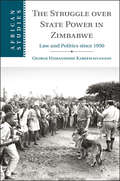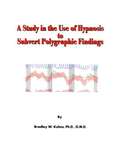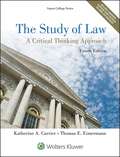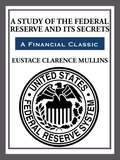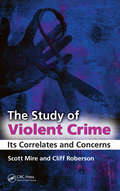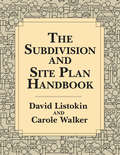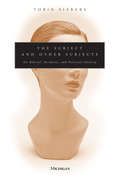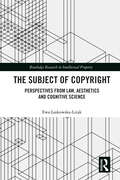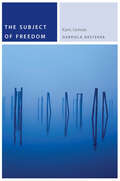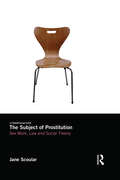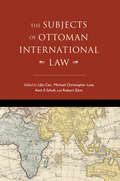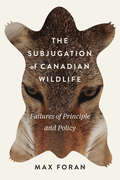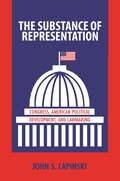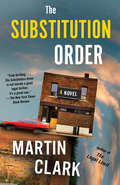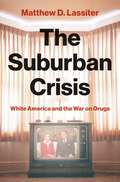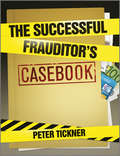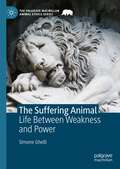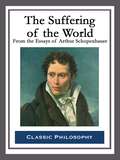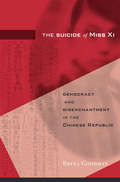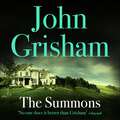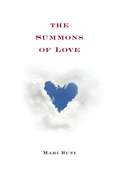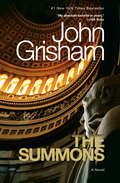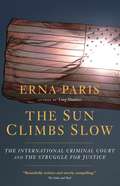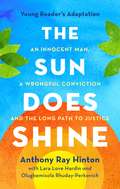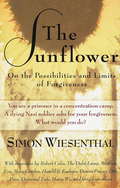- Table View
- List View
The Struggle over State Power in Zimbabwe: Law and Politics since 1950 (African Studies #139)
by George Hamandishe KarekwaivananeThe establishment of legal institutions was a key part of the process of state construction in Africa, and these institutions have played a crucial role in the projection of state authority across space. This is especially the case in colonial and postcolonial Zimbabwe. George Karekwaivanane offers a unique long-term study of law and politics in Zimbabwe, which examines how the law was used in the constitution and contestation of state power across the late-colonial and postcolonial periods. Through this, he offers insight on recent debates about judicial independence, adherence to human rights, and the observation of the rule of law in contemporary Zimbabwean politics. The book sheds light on the prominent place that law has assumed in Zimbabwe's recent political struggles for those researching the history of the state and power in Southern Africa. It also carries forward important debates on the role of law in state-making, and will also appeal to those interested in African legal history. Offers readers a unique long-term study of law and politics in Zimbabwe, providing an extensive overview in one key text. By avoiding technical legal concepts, the book offers a multidisciplinary approach to Zimbabwean law and history. Taking forward important debates in the social and political history of law in Africa, it will appeal to students and scholars interested in historiographical debates in African history.
The Study in the Use of Hypnosis to Subvert Polygraphic Findings
by Bradley W. Kuhns, Ph.D., O.M.D.An informative manual that may be of interest to the law enforcement officer, investigators and those who use polygraph and investigative hypnosis in the scope of their duties. This is a controlled study that was conducted by doctor Kuhns investigating the facts of if someone using hypnosis as a polygraph countermeasure could affect the results of a polygraph examination.
The Study of Law: A Critical Thinking Approach (Fourth Edition )
by Thomas E. Eimermann Katherine A. CurrierThe Study of Law: A Critical Thinking Approach focuses on the basic foundations of the law and on the legal reasoning process. In addition to presenting an overview of the legal system, this book teaches the basic skills necessary to read and understand statutes and court cases. Part 1, The American Legal System, introduces students to the study of law and the organization of the legal system. Part 2, Substantive Law and Ethical Issues, introduces students to basic concepts and terminology used in the most prominent substantive areas of law.
The Study of The Federal Reserve and Its Secrets
by Eustace Clarence MullinsIn the fall of 1949 I went to the Library of Congress to get material for a newspaper article about the Federal Reserve Board of Governors. What I expected to be a week's labor turned into a lengthy research job of nineteen months, for I discovered, in my initial inquiry, that there existed not one narrative account of the origins and activities of this powerful organization. The standard works on the Federal Reserve System, almost entirely abstruse and technical works on economics, I found of little practical value. Even in the matter of acceptances, the usual textbooks contained no information upon such an important item in America's economic history as the changeover from the open-book system of credit to the acceptance system, which has wrought such vast changes in our practice of commerce, and for this information I found only one source, a few pamphlets published by the American Acceptance Council from 1915 to 1928. It is, then, little wonder that the student with a Master's Degree in Economics from one of the better universities will see here for the first time material which should have been before him in his elementary courses." Eustace Clarence Mullins, Jr was a populist American political writer and biographer. His most famous and influential work is The Secrets of The Federal Reserve, described by congressman Wright Patman as 'a very fine book [which] has been very useful to me'. He is generally regarded as one of the most influential authors in the genre of conspiracism.
The Study of Violent Crime: Its Correlates and Concerns
by Cliff Roberson Scott MireViolence is a complex subject that is rooted in a multitude of disciplines, including not only criminology but also psychology, sociology, biology, and other social science disciplines. It is only through understanding violence as a concept that we can hope to respond to it appropriately and to prevent it. The Study of Violent Crime: Its Correlates
The Subdivision and Site Plan Handbook
by David Listokin Carole WalkerThe Supreme Court decision that property owners may be entitled to compensation for government regulations that deprive them of reasonable use of their property has thrown the land-use field into a state of turmoil. Will municipal land-use ordinances be found excessive? What regulations can be considered a reasonable exercise of police power for public health, safety, and welfare? Will municipalities be liable for compensation to property owners if development is restricted? How can municipalities and developers plan in the wake of this decision?Ordinance provisions cover components of subdivision regulation: general provisions, definitions, administration, procedure, design and improvements, off-tract improvements, and documents to be submitted. The Subdivision and Site Plan Handbook provides a narrative on the background, rationale, and intent of each requirement accompanying the model ordinance; gives an overview of the history of subdivision regulation in the United States; traces the evolution of land-use regulation through various stages; and presents the legal context for present-day regulation.The book has been designed for use by government administrators, developers, planners, attorneys, and others interested in land-use regulation. The model ordinance represents the most current thinking about land use and site control and responds to questions raised by the Supreme Court decision. David Listokin and Carole Walker's analyses are flexible, efficient, responsive to local conditions, and balance regulatory costs and benefits.
The Subject and Other Subjects: On Ethical, Aesthetic, and Political Identity
by Tobin SiebersThe Subject and Other Subjectstheorizes the differences among ethical, aesthetic, and political conceptions of identity. When a person is called beautiful, why does it strike us as an objectification? Is a person whom we consider to be an exemplary person still a person, and not an example? Can one person conceive what it means to have the perspective of a community? This study treats these thorny issues in the context of recent debates in cultural studies, feminism, literary criticism, narrative theory, and moral philosophy concerning the nature and directions of multiculturalism, post-modernity, and sexual politics. Tobin Siebers raises a series of questions that "cross the wires" among ethical, aesthetic, and political definitions of the self, at once exposing our basic assumptions about these definitions and beginning the work of reconceiving them. The Subject and Other Subjectswill broaden our ideas about the strange interplay between subjects and objects (and other subjects!) that characterizes modern identity, and so provoke lively debate among anthropologists, art historians, literary theorists, philosophers, and others concerned with how the question of the subject becomes entangled with ethics, aesthetics, and politics. As Siebers argues, the subject is in fact a tangled network of subjectivities, a matrix of identities inconceivable outside of symbols and stories. Tobin Siebers is Professor of English at the University of Michigan, and author ofCold War Criticism and the Politics of Skepticism; Morals and Stories; The Ethics of Criticism; The Romantic Fantastic; andThe Mirror of Medusa.
The Subject of Copyright: Perspectives from Law, Aesthetics and Cognitive Science (Routledge Research in Intellectual Property)
by Ewa Laskowska-LitakExploring the concept of copyright subject matter through the lenses of law, aesthetics and cognitive science, this book describes the historical evolution of a work into an artefact that qualifies as copyrightable subject matter. Discussing the originality requirement towards an artefactual understating of intangible goods, copyright’s present struggles with modern societies and technologies, and growing inequalities between rights holders and producers, the book adopts an interdisciplinary approach based on studies in law, aesthetics, neuroscience, and cognitive science to present a novel perspective on the non-artefactual and contextual identification of copyright subject matter. The book examines the challenges raised by aesthetic and neuroaesthetic concepts and cognitive studies, seeking to create a unifying framework of identification strategies for modern copyright law which embrace historical, philosophical and social perspectives, the book develops a research methodology that offers a new interdisciplinary and holistic approach for understanding the subject of copyright and better addressing the needs of modern society, technology and business models. Touching on normative understandings of creativity and legal-philosophical, aesthetic, and cognitive considerations with regard to the idea/expression dichotomy in copyright law, the book will be of immense interest to legal scholars, legal philosophers, aestheticians and neuroaestheticians.
The Subject of Freedom: Kant, Levinas (Commonalities)
by Gabriela BasterraIs freedom our most essential belonging, the intimate source of self-mastery, an inalienable right? Or is it something foreign, an other that constitutes subjectivity, a challenge to our notion of autonomy? To Basterra, the subjectivity we call free embodies a relationship with an irreducible otherness that at once exceeds it and animates its core.Tracing Kant’s concept of freedom from the Critique of Pure Reason to his practical works, Basterra elaborates his most revolutionary insights by setting them in dialogue with Levinas’s Otherwise than Being. Levinas’s text, she argues, offers a deep critique of Kant that follows the impulse of his thinking to its most promising consequences. The complex concepts of freedom, autonomy, and subjectivity that emerge from this dialogue have the potential to energize today’s ethical and political thinking.
The Subject of Prostitution: Sex Work, Law and Social Theory
by Jane ScoularThe Subject of Prostitution offers a distinctive analysis of the links between prostitution and social theory in order to advance a critical analysis of the relationship of law to sex work. Using the lens of social theory to disrupt fixed meanings the book provides an advanced analytical framework through which to understand the complexity and contingencies of sex work in late modernity. The book analyses contemporary citizenship discourse and the law's ability to meet the competing demands of empowerment by sex workers and protection by radical feminists who view prostitution as the epitome of patriarchal sexual and economic relations. Its central focus is the role of law in both structuring and responding to the 'problem of prostitution'. By developing a distinctive constitutive approach to law, the author offers a more advanced analytical framework from which to understand how law matters in contemporary debates and also suggests how law could matter in more imaginative justice reforms. This is particularly pertinent in a period of unprecedented legal reform, both internationally and nationally, as legal norms simultaneously attempt to protect, empower and criminalise parties involved in the purchase of sexual services. The Subject of Prostitution aims to overcome the current aporia in these debates and suggest new ways to engage with the subject and law. As such, The Subject of Prostitution provides an advanced theoretical resource for policymakers, researchers and activists involved in contemporary struggles over the meanings and place of sex work in late modernity.
The Subjects of Ottoman International Law
by Faiz Ahmed Julia Stephens Umut Özsu Will Smiley Will Hanley Michael Christopher Low Aimee M. Genell Lâle Can Jeffrey Dyer David Gutman Stacy D. FahrentholdThe core of this edited volume originates from a special issue of the Journal of the Ottoman and Turkish Studies Association (JOTSA) that goes well beyond the special issue to incorporate the stimulating discussions and insights of two Middle East Studies Association conference roundtables and the important work of additional scholars in order to create a state-of-the-field volume on Ottoman sociolegal studies, particularly regarding Ottoman international law from the eighteenth century to the end of the empire. It makes several important contributions to Ottoman and Turkish studies, namely, by introducing these disciplines to the broader fields of trans-imperial studies, comparative international law, and legal history. Combining the best practices of diplomatic history and history from below to integrate the Ottoman Empire and its subjects into the broader debates of the nineteenth-century trans-imperial history this unique volume represents the exciting work and cutting-edge scholarship on these topics that will continue to shape the field in years to come.
The Subjugation of Canadian Wildlife: Failures of Principle and Policy (McGill-Queen's Rural, Wildland, and Resource Studies #9)
by Max ForanHardly a day goes by without news of the extinction or endangerment of yet another animal species, followed by urgent but largely unheeded calls for action. An eloquent denunciation of the failures of Canada’s government and society to protect wildlife from human exploitation, Max Foran’s The Subjugation of Canadian Wildlife argues that a root cause of wildlife depletions and habitat loss is the culturally ingrained beliefs that underpin management practices and policies. <P><P>Tracing the evolution of the highly contestable assumptions that define the human–wildlife relationship, Foran stresses the price wild animals pay for human self-interest. Using several examples of government oversight at the federal, provincial, and territorial levels, from the Species at Risk Act to the Biodiversity Strategy, Protected Areas Network, and provincial management plans, this volume shows that wildlife policies are as much – or more – about human needs, priorities, and profit as they are about preservation. Challenging established concepts including ecological integrity, adaptive management, sport hunting as conservation, and the flawed belief that wildlife is a renewable resource, the author compels us to recognize animals as sentient individuals and as integral components of complex ecological systems. <P><P>A passionate critique of contemporary wildlife policy, The Subjugation of Canadian Wildlife calls for belief-change as the best hope for an ecologically healthy, wildlife-rich Canada.
The Substance of Representation: Congress, American Political Development, and Lawmaking (Princeton Studies in American Politics: Historical, International, and Comparative Perspectives #133)
by John S. LapinskiLawmaking is crucial to American democracy because it completely defines and regulates the public life of the nation. Yet despite its importance, political scientists spend very little time studying the direct impact that the politics surrounding a particular issue has on lawmaking. The Substance of Representation draws on a vast range of historical and empirical data to better understand how lawmaking works across different policy areas. Specifically, John Lapinski introduces a theoretically grounded method for parsing policy issues into categories, and he shows how policymaking varies in predictable ways based on the specific issue area being addressed. Lapinski examines the ways in which key factors that influence policymaking matter for certain types of policy issues, and he includes an exhaustive look at how elite political polarization shifts across these areas. He considers how Congress behaves according to the policy issue at hand, and how particular areas--such as war, sovereignty issues, and immigration reform--change legislative performance. Relying on records of all Congressional votes since Reconstruction and analyzing voting patterns across policy areas from the late nineteenth to late twentieth centuries, Lapinski provides a comprehensive historical perspective on lawmaking in order to shed light on current practices. Giving a clear picture of Congressional behavior in the policymaking process over time, The Substance of Representation provides insights into the critical role of American lawmaking.
The Substitution Order: A novel
by Martin ClarkFrom Martin Clark--praised by Entertainment Weekly as "our best legal-thriller writer"--comes a wickedly clever, tenderhearted, and intricately plotted novel about a hard-luck lawyer's refusal to concede defeat, even as fate, the court system, and a gang of untouchable con artists conspire against him.Kevin Moore, once a high-flying Virginia attorney, hits rock bottom after an inexplicably tumultuous summer leaves him disbarred and separated from his wife. Short on cash and looking for work, he lands in the middle of nowhere with a job at SUBstitution, the world's saddest sandwich shop. His closest confidants: a rambunctious rescue puppy and the twenty-year-old computer whiz manning the restaurant counter beside him. He's determined to set his life right again, but the troubles keep coming. And when a bizarre, mysterious stranger wanders into the shop armed with a threatening "invitation" to join a multimillion-dollar scam, Kevin will need every bit of his legal savvy just to stay out of prison. A remarkable tour of the law's tricks and hidden trapdoors, The Substitution Order is both wise and ingenious, a wildly entertaining novel that will keep you guessing--and rooting for its tenacious hero--until the very last page.
The Suburban Crisis: White America and the War on Drugs
by Matthew D. LassiterHow the drug war transformed American political cultureSince the 1950s, the American war on drugs has positioned white middle-class youth as sympathetic victims of illegal drug markets who need rehabilitation instead of incarceration whenever they break the law. The Suburban Crisis traces how politicians, the media, and grassroots political activists crusaded to protect white families from perceived threats while criminalizing and incarcerating urban minorities, and how a troubling legacy of racial injustice continues to inform the war on drugs today.In this incisive political history, Matthew Lassiter shows how the category of the “white middle-class victim” has been as central to the politics and culture of the drug war as racial stereotypes like the “foreign trafficker,” “urban pusher,” and “predatory ghetto addict.” He describes how the futile mission to safeguard and control white suburban youth shaped the enactment of the nation’s first mandatory-minimum drug laws in the 1950s, and how soaring marijuana arrests of white Americans led to demands to refocus on “real criminals” in inner cities. The 1980s brought “just say no” moralizing in the white suburbs and militarized crackdowns in urban centers.The Suburban Crisis reveals how the escalating drug war merged punitive law enforcement and coercive public health into a discriminatory system for the social control of teenagers and young adults, and how liberal and conservative lawmakers alike pursued an agenda of racialized criminalization.
The Successful Frauditor's Casebook
by Peter TicknerLearn what works well and avoid the pitfalls in the real world of fraud detection and fraud investigationThis casebook reveals how frauds and fraudsters were discovered--and delves into the investigations that followed. Each chapter covers a particular case, analyzing the factors that allowed fraud to develop and assessing the effectiveness of the detection process and the resulting fraud investigation. Importantly, the casebook examines the steps taken by organizations to recover from the cost of fraud and the damage that fraud has caused.High-profile author, Peter Tickner, is well known in auditing and investigative circlesCases of fraud, drawn from the author's direct experience as well as world-wide, are supplemented with checklists and practical guidance on fraud detection
The Suffering Animal: Life Between Weakness and Power (The Palgrave Macmillan Animal Ethics Series)
by Simone GhelliThis book provides a critical and innovative reassessment of contemporary debate on the human-animal relationship. Starting with a critique of the “official philosophical narration” of animal studies, and then a reassessment of Descartes' animal-machine paradigm, Simone Ghelli tracks down the conceptual coordinates of what he calls “the paradigm of the suffering animal.” The suffering animal is a materialist thesis on the condition of the living, which, while contesting the metaphysical and anthropocentric structure of western axiology, eventually redefines and re-establishes ethics on the experience of suffering, that is on the mutual compassion sentient beings feel before the unjust sight of their finitude. The suffering animal paradigm shows how, within our philosophical tradition, the animal question has been always intertwined with the questions of atheism and of materialism. The ultimate aim of this research is to define the “ethical equilibrium” between aspects of the living, such as weakness and power, joy and suffering, life and death, which our philosophical tradition largely tends to consider as mutually excluding. To overcome such oppositions means avoiding opposing, in our ethical and political discourse, the defense of the vulnerability of the weak and the freedom of the powerful.
The Suffering of the World
by Arthur SchopenhauerArthur Schopenhauer was one of the world's most influential philosophers. Included here are nine of his most important essays, including 'On the Sufferings of the World,' 'The Vanity of Existence,' 'On Suicide,' 'Immortality: a Dialogue,' 'Psychological Observations,' 'On Education,' 'Of Women,' 'On Noise,' and
The Suicide of Miss Xi: Democracy and Disenchantment in the Chinese Republic
by Bryna GoodmanA suicide scandal in Shanghai reveals the social fault lines of democratic visions in China’s troubled Republic in the early 1920s. On September 8, 1922, the body of Xi Shangzhen was found hanging in the Shanghai newspaper office where she worked. Although her death took place outside of Chinese jurisdiction, her US–educated employer, the social activist Tang Jiezhi, was kidnapped by Chinese authorities and put on trial. As scandal rocked the city, novelists, filmmakers, suffragists, reformers, and even a founding member of the Chinese Communist Party seized upon the case as emblematic of deeper social problems. Xi’s family claimed that Tang had pressured her to be his concubine; his conviction instead for financial fraud only stirred further controversy. The creation of a republic ten years earlier had unleashed a powerful vision of popular sovereignty and a view of citizenship founded upon science, equality, and family reform. But, Bryna Goodman shows, after the suppression of the first Chinese parliament, efforts at urban liberal democracy dissolved in a flash of speculative finance and the suicide of an educated, working “new woman.” In yet another blow, Tang’s trial exposed the frailty of legal mechanisms in a political landscape fragmented by warlords and enclaves of foreign colonial rule. The Suicide of Miss Xi opens a window onto how urban Chinese in the first part of the twentieth century navigated China’s early passage through democratic populism, in an ill-fated moment of possibility between empire and party dictatorship. Xi Shangzhen became a symbol of the failures of the Chinese Republic as well as the broken promises of citizen’s rights, gender equality, and financial prosperity betokened by liberal democracy and capitalism.
The Summons
by John GrishamRay Atlee is a professor of law at the University of Virginia. He's forty-three, newly single, and still enduring the aftershocks of a surprise divorce. He has a younger brother, Forrest, who redefines the notion of a family's black sheep.And he has a father, a very sick old man who lives alone in the ancestral home in Clanton, Mississippi. He is known to all as Judge Atlee, a beloved and powerful official who has towered over local law and politics for forty years. No longer on the bench, the Judge has withdrawn to the Atlee mansion and become a recluse.With the end in sight, Judge Atlee issues a summons for both sons to return home to Clanton, to discuss the details of his estate. It is typed by the Judge himself, on his handsome old stationery, and gives the date and time for Ray and Forrest to appear in his study.Ray reluctantly heads south, to his hometown, to the place where he grew up, which he prefers now to avoid. But the family meeting does not take place. The Judge dies too soon, and in doing so leaves behind a shocking secret known only to Ray.And perhaps someone else.(P)2002 Random House, LLC
The Summons of Love
by Mari RutiWe are conditioned to think that love heals wounds, makes us happy, and gives our lives meaning. When the opposite occurs and love causes fracturing, disenchantment, and existential turmoil, we suffer deeply, especially if we feel that love has failed us or that we have failed to experience what others seem so effortlessly to enjoy. In this eloquently argued, psychologically informed book, Mari Ruti portrays love as a much more complex, multifaceted phenomenon than we tend to appreciate—an experience that helps us encounter the depths of human existence. Love's ruptures are as important as its triumphs, and sometimes love succeeds because it fails. At the heart of Ruti's argument is a meditation on interpersonal ethics that acknowledges the inherent opacity of human interiority and the difficulty of taking responsibility for what we cannot fully understand. Yet the fact that humans are often irrational in love does not absolve us of ethical accountability. In Ruti's view, we must work harder to map the unconscious patterns motivating our romantic behavior. As opposed to popular spiritual approaches urging us to live fully in the now, Ruti treats the past as a living component of the present. Only when we catch ourselves at those moments when the past speaks in the present can we keep ourselves from hurting the ones we love. Equally important, Ruti emphasizes transcending our individual histories of pain, an act that allows us to face the unconscious demons that dictate our relational choices. Written with substance and compassion, The Summons of Love restores the enlivening and transformative possibilities of romance.
The Summons: A Novel
by John Grisham#1 NEW YORK TIMES BESTSELLER • A pillar of the community who towered over local law and politics for forty years, Judge Atlee is now a shadow of his former self—a sick, lonely old man who has withdrawn to his sprawling ancestral home in Clanton, Mississippi. Knowing that the end is near, Judge Atlee has issued a summons for his two sons to return to Clanton to discuss his estate. Ray Atlee is the elder, a Virginia law professor, newly single, still enduring the aftershocks of a surprise divorce. Forrest is Ray&’s younger brother, the family&’s black sheep.The summons is typed by the Judge himself, on his handsome old stationery, and gives the date and time for Ray and Forrest to appear in his study. Ray reluctantly heads south to his hometown, to the place he now prefers to avoid. But the family meeting does not take place. The Judge dies too soon, and in doing so leaves behind a shocking secret known only to Ray . . . and perhaps to someone else.Don&’t miss John Grisham&’s new book, THE EXCHANGE: AFTER THE FIRM!
The Sun Climbs Slow: The International Criminal Court and the Struggle for Justice
by Erna ParisIn this groundbreaking investigation, Erna Paris explores the history of global justice, the politics behind America's opposition to the creation of a permanent international criminal court, and the implications for the world at large.The International Criminal Court (ICC) is the first permanent tribunal of its kind. The mandate of the ICC is to challenge criminal impunity on the part of national leaders and to promote accountability in world affairs at the highest level. Independent and transnational, its indictments cannot be vetoed in the Security Council.On March 11, 2003, when the new court was inaugurated in a moving ceremony, attended by over half of the countries in the world, one country was conspicuously missing from the celebrations. The government of the United States had made it clear that the International Criminal Court was not consistent with American goals and values.
The Sun Does Shine (Young Readers Edition): An Innocent Man, A Wrongful Conviction, and the Long Path to Justice
by Olugbemisola Rhuday-Perkovich Anthony Ray Hinton Lara Love HardinThe Sun Does Shine is an extraordinary testament to the power of hope sustained through the darkest times, now adapted for younger readers, with a revised foreword by Just Mercy author Bryan Stevenson.In 1985, Anthony Ray Hinton was arrested and charged with two counts of capital murder in Alabama. Stunned, confused, and only 29 years old, Hinton knew that it was a case of mistaken identity and believed that the truth would prove his innocence and ultimately set him free.But with a criminal justice system with the cards stacked against Black men, Hinton was sentenced to death . He spent his first three years on Death Row in despairing silence—angry and full of hatred for all those who had sent an innocent man to his death. But as Hinton realized and accepted his fate, he resolved not only to survive, but find a way to live on Death Row. For the next twenty-seven years he was a beacon—transforming not only his own spirit, but those of his fellow inmates. With the help of civil rights attorney and bestselling author of Just Mercy, Bryan Stevenson, Hinton won his release in 2015.With themes both timely and timeless, Hinton’s memoir tells his dramatic 30-year journey and shows how you can take away a man’s freedom, but you can’t take away his imagination, humor, or joy.
The Sunflower: On the Possibilities and Limits of Forgiveness
by Simon WiesenthalWhile imprisoned in a Nazi concentration camp, Simon Wiesenthal was taken one day from his work detail to the bedside of a dying member of the SS. Haunted by the crimes in which he had participated, the soldier wanted to confess to--and obtain absolution from--a Jew. Faced with the choice between compassion and justice, silence and truth, Wiesenthal said nothing. But even years after the way had ended, he wondered: Had he done the right thing? What would you have done in his place?In this important book, fifty-three distinguished men and women respond to Wiesenthal's questions. They are theologians, political leaders, writers, jurists, psychiatrists, human rights activists, Holocaust survivors, and victims of attempted genocides in Bosnia, Cambodia, China and Tibet. Their responses, as varied as their experiences of the world, remind us that Wiesenthal's questions are not limited to events of the past. Often surprising and always thought provoking, The Sunflower will challenge you to define your beliefs about justice, compassion, and human responsibility.From the Trade Paperback edition.
